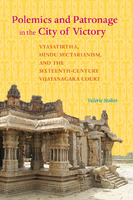Polemics and Patronage in the City of Victory: Vyasatirtha, Hindu Sectarianism, and the Sixteenth-Century Vijayanagara Court
Abstract
How did the patronage activities of India’s Vijayanagara Empire (c. 1346–1565) influence Hindu sectarian identities? Although the empire has been commonly viewed as a Hindu bulwark against Islamic incursion from the north or as a religiously ecumenical state, Valerie Stoker argues that the Vijayanagara court was selective in its patronage of religious institutions. To understand the dynamic interaction between religious and royal institutions in this period, she focuses on the career of the Hindu intellectual and monastic leader Vy?sat?rtha. An agent of the state and a powerful religious authority, Vy?sat?rtha played an important role in expanding the empire’s economic and social networks. By examining his polemics against rival sects in the context of his work for the empire, Stoker provides a remarkably nuanced picture of the relationship between religious identity and sociopolitical reality under Vijayanagara rule.
Keywords
vyasatirtha; hinduism; vijayanagar empire; Advaita Vedanta; Brahmin; Dvaita Vedanta; Matha; Moksha; Sectarianism; Smarta tradition; SringeriDOI
10.1525/luminos.18ISBN
9780520965461OCN
959728089Publisher
University of California PressPublisher website
https://www.ucpress.edu/Publication date and place
Oakland, California, 2016Classification
History
Asian history
Religion: general
Other religions and spiritual beliefs


 Download
Download Web Shop
Web Shop